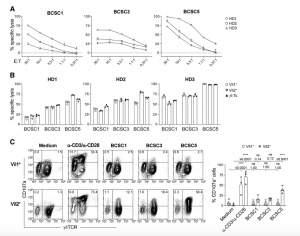Triple-negative breast cancer is a type of breast cancer that is particularly aggressive and often fatal due to limited treatment options and a high likelihood of recurrence.
Researchers have recently discovered that breast cancer stem cells evade the immune system by coordinating changes in their differentiation and metabolism (Figure 1). Specifically, the stem cells downregulate the mevalonate pathway, a metabolic pathway that leads to the production of molecules that gamma delta T cells can recognize.

Figure 1 : Expanded gd T cells recognize and kill BCSCs in vitro. A, In vitro killing of luciferase-expressing BCSCs by gd T cells after 8 hours at various effector to target (E:T) ratios. Results from two independent experiments with a total of 3 healthy donors (HD) of gd T cells are shown (means SEM). B, In vitro killing of BCSCs by gd T cells and MACS-separated Vd1þ and Vd2þ T cells performed as in A. Cells were cocultured at an E:T ratio of 10:1. Results from 3 healthy donors of gd T cells are shown (means SEM). C, Flow cytometry-based analysis of degranulation by MACS-separated Vd1þ or Vd2þT cells in response to BCSC contact for 3 hours. Stimulation with anti-CD3 and anti-CD28 served as positive control. Representative dot plots (left) and statistical analysis (right) of the percentage of CD107aþVd1þ or CD107aþVd2þcells. Results from 2 healthy donors of gd T cells obtained in three independent experiments were pooled (means SEM). Two-way ANOVA followed by Sidak post hoc test comparing stimulated or cocultured cells with the corresponding medium control, P ≤ 0.0001. E:T, effector to target; HD, healthy donor; ns, nonsignficant.
Gamma delta T cells are a type of immune cell that can recognize and kill cells that produce stress-induced molecules and phosphoantigens, which are common characteristics of cancer cells.
While gamma delta T cells have been proposed as a potential immunotherapy for triple-negative breast cancer, the researchers found that the cancer cells’ adaptations make them less effective in a mouse model. However, the researchers discovered that zolendronate, a drug used to treat osteoporosis and bone metastasis, can counteract the metabolic change in the cancer cells and make gamma delta T cells more efficient at clearing the cancer cells. The findings suggest that zolendronate could be a promising approach to enhance the efficacy of gamma delta T cells against triple-negative breast cancer and to develop novel combinatorial immunotherapies.
Journal article: Raute, K., et al., 2023. Breast Cancer Stem Cell–Derived Tumors Escape from γδ T-cell Immunosurveillance In Vivo by Modulating γδ T-cell Ligands. Cancer Immunology Research.
Summary by Stefan Botha










